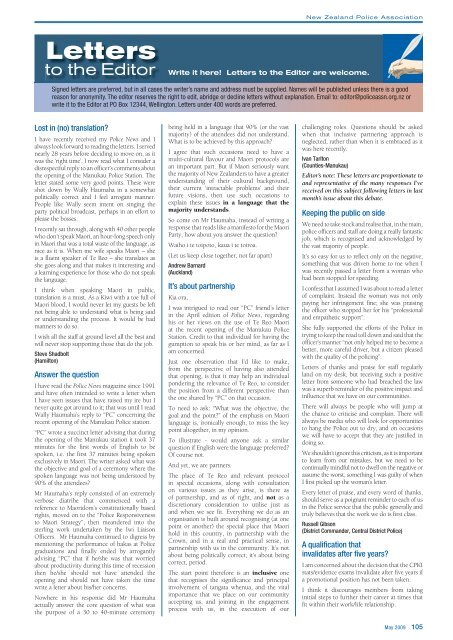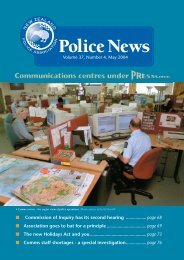Police News May 09.indd - New Zealand Police Association
Police News May 09.indd - New Zealand Police Association
Police News May 09.indd - New Zealand Police Association
Create successful ePaper yourself
Turn your PDF publications into a flip-book with our unique Google optimized e-Paper software.
<strong>New</strong> <strong>Zealand</strong> <strong>Police</strong> <strong>Association</strong>Write it here! Letters to the Editor are welcome.Signed letters are preferred, but in all cases the writer’s name and address must be supplied. Names will be published unless there is a goodreason for anonymity. The editor reserves the right to edit, abridge or decline letters without explanation. Email to: editor@policeassn.org.nz orwrite it to the Editor at PO Box 12344, Wellington. Letters under 400 words are preferred.Lost in (no) translation?I have recently received my <strong>Police</strong> <strong><strong>New</strong>s</strong> and Ialways look forward to reading the letters. I servednearly 28 years before deciding to move on, as itwas the ‘right time’. I now read what I consider adisrespectful reply to an officer’s comments aboutthe opening of the Manukau <strong>Police</strong> Station. Theletter stated some very good points. These wereshot down by Wally Haumaha in a somewhatpolitically correct and I feel arrogant manner.People like Wally seem intent on singing theparty political broadcast, perhaps in an effort toplease the bosses.I recently sat through, along with 40 other peoplewho don’t speak Maori, an hour-long speech onlyin Maori that was a total waste of the language, asnice as it is. When me wife speaks Maori – sheis a fluent speaker of Te Reo – she translates asshe goes along and that makes it interesting anda learning experience for those who do not speakthe language.I think when speaking Maori in public,translation is a must. As a Kiwi with a toe full ofMaori blood, I would never let my guests be leftnot being able to understand what is being saidor understanding the process. It would be badmanners to do so.I wish all the staff at ground level all the best andwill never stop supporting those that do the job.Steve Shadbolt(Hamilton)Answer the questionI have read the <strong>Police</strong> <strong><strong>New</strong>s</strong> magazine since 1991and have often intended to write a letter whenI have seen issues that have raised my ire but Inever quite got around to it; that was until I readWally Haumaha’s reply to “PC” concerning therecent opening of the Manukau <strong>Police</strong> station.“PC” wrote a succinct letter advising that duringthe opening of the Manukau station it took 37minutes for the first words of English to bespoken, i.e. the first 37 minutes being spokenexclusively in Maori. The writer asked what wasthe objective and goal of a ceremony where thespoken language was not being understood by90% of the attendees?Mr Haumaha’s reply consisted of an extremelyverbose diatribe that commenced with areference to Maoridom’s constitutionally basedrights, moved on to the “<strong>Police</strong> Responsivenessto Maori Strategy”, then meandered into thesterling work undertaken by the Iwi LiaisonOfficers. Mr Haumaha continued to digress bymentioning the performance of hakas at <strong>Police</strong>graduations and finally ended by arrogantlyadvising “PC” that if he/she was that worriedabout productivity during this time of recessionthen he/she should not have attended theopening and should not have taken the timewrite a letter about his/her concerns.Nowhere in his response did Mr Haumahaactually answer the core question of what wasthe purpose of a 30 to 40-minute ceremonybeing held in a language that 90% (or the vastmajority) of the attendees did not understand.What is to be achieved by this approach?I agree that such occasions need to have amulti-cultural flavour and Maori protocols arean important part. But if Maori seriously wantthe majority of <strong>New</strong> <strong>Zealand</strong>ers to have a greaterunderstanding of their cultural background,their current ‘intractable problems’ and theirfuture visions, then use such occasions toexplain these issues in a language that themajority understands.So come on Mr Haumaha, instead of writing aresponse that reads like a manifesto for the MaoriParty, how about you answer the question?Waiho i te toipoto, kaua i te toiroa.(Let us keep close together, not far apart)Andrew Barnard(Auckland)It’s about partnershipKia ora,I was intrigued to read our “PC” friend’s letterin the April edition of <strong>Police</strong> <strong><strong>New</strong>s</strong>, regardinghis or her views on the use of Te Reo Maoriat the recent opening of the Manukau <strong>Police</strong>Station. Credit to that individual for having thegumption to speak his or her mind, as far as Iam concerned.Just one observation that I’d like to make,from the perspective of having also attendedthat opening, is that it may help an individualpondering the relevance of Te Reo, to considerthe position from a different perspective thanthe one shared by “PC” on that occasion.To need to ask: “What was the objective, thegoal and the point?” of the emphasis on Maorilanguage is, ironically enough, to miss the keypoint altogether, in my opinion.To illustrate - would anyone ask a similarquestion if English were the language preferred?Of course not.And yet, we are partners.The place of Te Reo and relevant protocolin special occasions, along with consultationon various issues as they arise, is there asof partnership, and as of right, and not as adiscretionary consideration to utilise just asand when we see fit. Everything we do as anorganisation is built around recognising (at onepoint or another) the special place that Maorihold in this country, in partnership with theCrown, and in a real and practical sense, inpartnership with us in the community. It’s notabout being politically correct; it’s about beingcorrect, period.The start point therefore is an inclusive onethat recognises the significance and principalinvolvement of tangata whenua, and the vitalimportance that we place on our communityaccepting us, and joining in the engagementprocess with us, in the execution of ourchallenging roles. Questions should be askedwhen that inclusive partnering approach isneglected, rather than when it is embraced as itwas here recently.Ivan Tarlton(Counties-Manukau)Editor’s note: These letters are proportionate toand representative of the many responses I’vereceived on this subject following letters in lastmonth’s issue about this debate.Keeping the public on sideWe need to take stock and realise that, in the main,police officers and staff are doing a really fantasticjob, which is recognised and acknowledged bythe vast majority of people.It’s so easy for us to reflect only on the negative;something that was driven home to me when Iwas recently passed a letter from a woman whohad been stopped for speeding.I confess that I assumed I was about to read a letterof complaint. Instead the woman was not onlypaying her infringement fine; she was praisingthe officer who stopped her for his “professionaland empathetic support”.She fully supported the efforts of the <strong>Police</strong> intrying to keep the road toll down and said that theofficer’s manner “not only helped me to become abetter, more careful driver, but a citizen pleasedwith the quality of the policing”.Letters of thanks and praise for staff regularlyland on my desk, but receiving such a positiveletter from someone who had breached the lawwas a superb reminder of the positive impact andinfluence that we have on our communities.There will always be people who will jump atthe chance to criticise and complain. There willalways be media who will look for opportunitiesto hang the <strong>Police</strong> out to dry, and on occasionswe will have to accept that they are justified indoing so.We shouldn’t ignore this criticism, as it is importantto learn from our mistakes, but we need to becontinually mindful not to dwell on the negative orassume the worst, something I was guilty of whenI first picked up the woman’s letter.Every letter of praise, and every word of thanks,should serve as a poignant reminder to each of usin the <strong>Police</strong> service that the public generally andtruly believes that the work we do is first class.Russell Gibson(District Commander, Central District <strong>Police</strong>)A qualification thatinvalidates after five years?I am concerned about the decision that the CPKIstats/evidence exams invalidate after five years ifa promotional position has not been taken.I think it discourages members from takinginitial steps to further their career at times thatfit within their work/life relationship.<strong>May</strong> 2009105

















